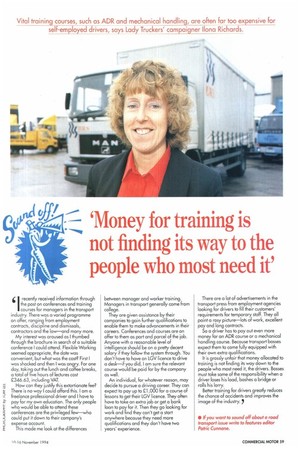'Money for training is not finding its way to the people who most need it'
Page 61

If you've noticed an error in this article please click here to report it so we can fix it.
6 recently received information through
I the post on conferences and training courses for managers in the transport industry. There was a varied programme on offer, ranging from employment contracts, discipline and dismissals, contractors and the law—and many more. My interest was aroused as I thumbed through the brochure in search of a suitable conference I could attend. Flexible Working seemed appropriate, the date was convenient, but what was the cost? First I was shocked and then I was angry. For one day, taking out the lunch and coffee breaks, a total of five hours of lectures cost £346.63, including VAT. How can they justify this extortionate fee? There is no way I could afford this. I am a freelance professional driver and I have to pay for my own education. The only people who would be able to attend these conferences are the privileged few—who could put it down to their company's expense account. This made me look at the differences between manager and worker training. Managers in transport generally come from college. They are given assistance by their companies to gain further qualifications to enable them to make advancements in their careers. Conferences and courses are on offer to them as part and parcel of the job. Anyone with a reasonable level of intelligence should be on a pretty decent salary if they follow the system through. You don't have to have an LGV licence to drive a desk—if you did, I am sure the relevant course would be paid for by the company as well.
An individual, for whatever reason, may decide to pursue a driving career. They can expect to pay up to £1,000 for a course of lessons to get their LGV licence. They often have to take an extra job or get a bank loan to pay for it. Then they go looking for work and find they can't get a start anywhere because they need more qualifications and they don't have two years' experience. There are a lot of advertisements in the transport press from employment agencies looking for drivers to fill their customers' requirements for temporary staff. They all paint a rosy picture—lots of work, excellent pay and long contracts. So a driver has to pay out even more money for an ADR course or a mechanical handling course. Because transport bosses expect them to come fully equipped with their own extra qualifications. It is grossly unfair that money allocated to training is not finding its way down to the people who most need it, the drivers. Bosses must take some of the responsibility when a driver loses his load, bashes a bridge or rolls his lorry. Better training for drivers greatly reduces the chance of accidents and improves the image of the industry.








































































































